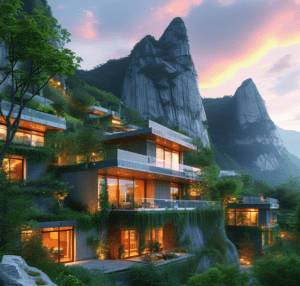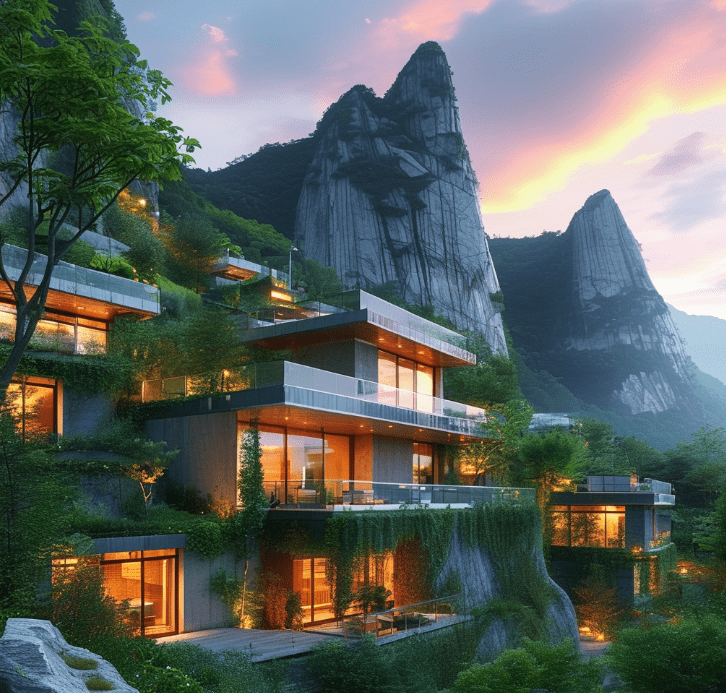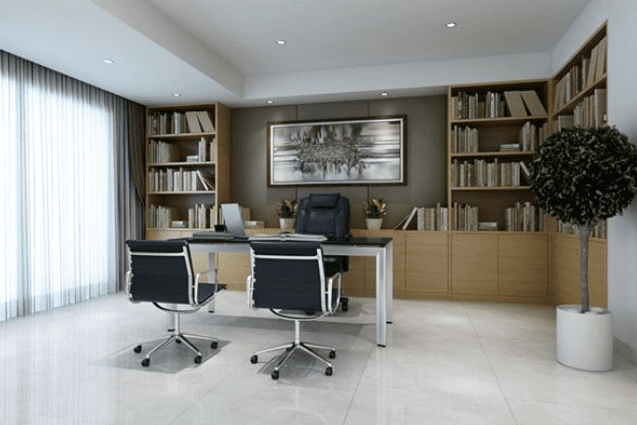1. It is not advisable to be close to buildings with evil spirits.

The residence should have a beautiful surrounding environment, including not only the greenery but also the coordinated surrounding buildings. Sometimes, although there is a backing mountain behind the residence, if the mountain’s shape is poor, it is not good feng shui. For example, if the relied-on mountain is not bright and beautiful but has ugly and strange rocks and no grass, it means that superiors or elders at work or in life will create all kinds of difficulties, while subordinates often pretend to obey but actually disobey. The back mountain should not be too steep or too high, as this will create a sense of oppression. Houses built too close to the mountain wall are not suitable for living either, as there is no room for manoeuvre at the back, indicating no retreat and blocked fortune with limited career development. Additionally, it is not suitable for residences to be close to buildings shaped like sharp knives inserted into the ground, or areas overly illuminated by excessive neon lights with strange light coverage. Residences close to such buildings are an ill omen and can easily cause energy leakage and other negative effects.
2. It is not advisable to be at the wind gap.

In feng shui, residences emphasize “hiding the wind and gathering qi”. Being at the wind gap and being blown by the wind every day contradicts the principle of “hiding the wind and gathering qi”. Even if this place is a prosperous position, the generated prosperous qi and wealth qi will be blown away by the wild wind and cannot accumulate indoors. If it is only a gentle breeze, even if it is at the wind gap, there is no problem; on the contrary, it is beneficial to improve the residence’s feng shui. If the wind is strong nearby, “qi scatters when blown by the wind”, and the “qi” in the environmental field will be scattered. When the inspected place has strong, urgent, fierce and harsh wind, then it should be considered to give it up first. Even if the prosperous qi cannot be retained, it is useless. Due to the excessive wind speed and significant changes in the field, it is difficult for people to adapt. It is difficult to establish a balance between the human field and the environmental field, and people will feel uncomfortable and even suffer from qi depletion and illness. Excessively strong wind is certainly not good, but if the air is not circulating, it is by no means a good living environment. No wind will create “dead qi” and “evil qi”. The human body itself and family life emit a large amount of waste gas every day. If the ventilation is poor and the indoor and outdoor air is difficult to exchange, the waste gas will accumulate indoors, causing self-pollution.
3. It is not advisable to be close to the roadside.

Modern people like residences surrounded by circular roads or other roads as this can make transportation more convenient. In fact, from the perspective of feng shui, even circular roads need to be differentiated based on specific circumstances. Smooth transportation is certainly a good thing, but if the chosen road is not good, it will also have a significant impact on residents. For example, the following situations should be noted with special attention.
1. If the road or river in front of the residence is at a U-shaped bend. If the residence is within the embrace, there will be a stable suggestion, which is conducive to enhancing the confidence in life and is suitable for living. However, buildings outside the U-shaped area are “anti-bow”, which is not only unstable. At the same time, attention should be paid to the noise problem. If there are too many vehicles or the river is too rapid and the noise is too loud, then whether it is inside or outside the loop, it is not suitable for living.
2. It is not advisable to have viaducts around the residence. Vehicles on the bridge have a great disturbance to residents and are very detrimental to health. The exhaust gas and noise generated when vehicles accelerate onto the bridge and quickly descend are large. The rapidly moving vehicles constantly impact the magnetic field around the residence, and the magnetic field is difficult to stabilize and will constantly interfere. Therefore, the impact of viaducts on residents is more significant than that of ordinary roads.
4. It is forbidden to have streets and roads directly facing the front of the house.

If the main door of a house is directly facing a road that rushes straight towards it, the longer the road is, the more dangerous it is, and the more vehicles there are, the more disasters there are. It is called a “tiger mouth house”, indicating that it is difficult to live peacefully in it.
The road outside the door is very important. In principle, “favourable for circular and unfavourable for direct”, incoming should be prosperous, outgoing should be declining. It should be curved and embraced, and avoid being straight. If the road outside the door is directly facing, anti-bow, or forked, it is definitely not auspicious. The road surface is wide and long, then smaller ones are taboo. When the road rushes behind the house, it is “back hitting”. If it directly faces the main door, it is the front rush, formerly called the “arrow through the heart evil spirit”, which is very inauspicious. The front rush is like a visible spear, and the back rush is like a hidden arrow.
5. It cannot be located at the end of the road.

There are two types: one is the end of the T-shaped road. The other is the innermost part of the dead-end alley.
There are two inauspicious factors at the end of the T-shaped road. In ancient times, when enemies attacked, such places were the most vulnerable to attack; in terms of defense, such places were also often used as strongholds to stop the enemy. Another inauspicious factor is the susceptibility to wind blowing. When strong winds strike, the strong wind passes through the roads between the juxtaposed houses and directly blows towards the house at the end. The same situation occurs during fires, and the flames often drift to the house at the end. A house at the end is an ill omen. Although there are no enemy attacks in modern society, accidents such as cars hitting people often occur. “A house built at the end of the road is extremely inauspicious”.
There are also obvious inauspicious factors in the innermost part of the dead-end alley. For example, it is inconvenient to have to pass through someone else’s door when going out; if the road is someone else’s private land, the other party is bound to have certain requirements or restrictions for you. There are also other risk factors: when a fire comes from the front at the end of the dead-end alley, there is often no escape route.
6. It cannot be built near a cemetery.

Near cemeteries, the yin qi is heavy, and “yin spirits” are concentrated here, belonging to the land of “yin evil spirits”.
If the main entrance of a residence directly faces a cemetery or crematorium, it will cause people to have a sense of fear or inexplicable feelings psychologically. If there is a mountain and a cemetery in front of the door, it is doubly inauspicious. Therefore, when choosing a residence on a hillside, it is necessary to first check if there are cemeteries nearby. The pattern of a hillside residence should be built against the mountain, with a backing, a wide front, no cemeteries nearby, plenty of sunlight, and the best is a hillside facing east, south or southeast.




